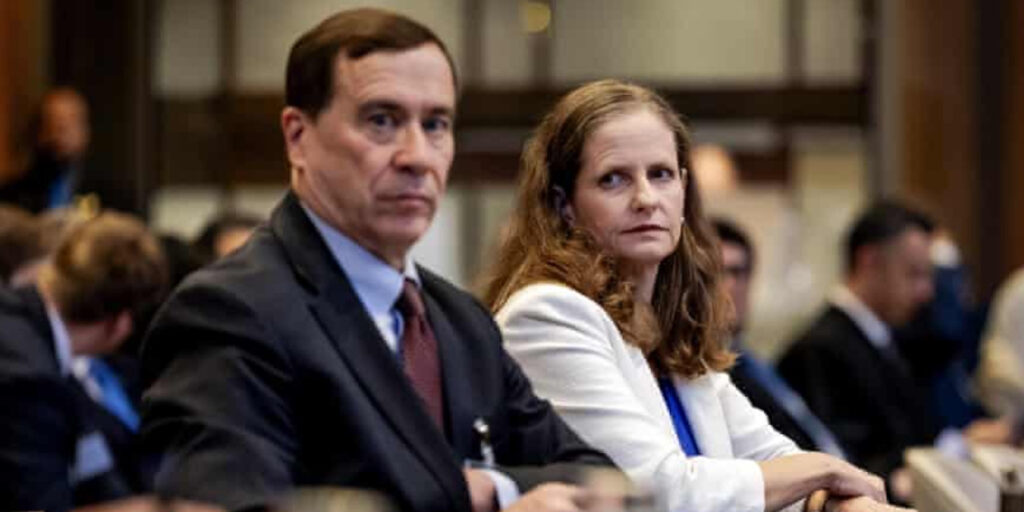Climate justice advocates have strongly condemned the United States after the world’s largest historical greenhouse gas emitter opposed legally binding obligations for nations to combat the escalating climate crisis.
This controversy unfolded during Wednesday’s historic climate hearing at the International Court of Justice (ICJ) in The Hague. Island nations and other vulnerable countries presented their case, demanding accountability from wealthy, high-polluting nations for their outsized role in driving climate change.
As climate disasters continue to devastate communities worldwide, hopes are fading that current climate pledges can curb rising global temperatures. Nevertheless, the U.S., alongside other fossil fuel-dependent nations, persists in expanding production. The U.S. argued that existing agreements, such as the United Nations Framework Convention on Climate Change (UNFCCC) and the 2015 Paris Agreement, offer the best path forward, opposing any new binding commitments.
According to Margaret Taylor, legal adviser at the U.S. State Department, the current UN climate framework “embodies the clearest, most specific, and most current expression of states’ consent to be bound by international law in respect of climate change.” Speaking to ICJ judges, Taylor stated that any additional legal obligations imposed by the court should align with the framework outlined in these treaties.
Activists Slam U.S. Position as Evasive
The U.S. stance sparked outrage among climate justice campaigners. Vishal Prasad, director of Pacific Islands Students Fighting Climate Change, criticized the U.S., stating: “Once again, we witness a disheartening attempt by the U.S. to evade its responsibilities as one of the world’s largest polluters. The U.S. is content with its business-as-usual approach and has taken every possible measure to shirk its historical responsibility, disregard human rights, and reject climate justice.”
Ashfaq Khalfan, Oxfam America’s climate justice director, called the Biden administration’s arguments before the ICJ “absurd,” particularly as the transition of power to president-elect Donald Trump could signal severe setbacks for U.S. climate policy.
Other major emitters, including Australia, China, and Saudi Arabia, also opposed legal accountability for climate damages, further frustrating climate-vulnerable nations.
ICJ Hearing Marks a Turning Point in Climate Accountability
The ICJ hearing follows years of advocacy by climate-vulnerable nations and global climate justice movements. The United Nations tasked the ICJ with issuing an advisory opinion on state obligations to address climate change and the potential legal consequences of failing to act.
More than 100 countries and organizations are expected to testify over the two-week session. Activists hope the ICJ’s opinion will elevate science and justice within international climate law and drive urgent, transformative action. While non-binding, the advisory opinion could significantly influence future climate litigation and international negotiations.
Pacific nations, led by Vanuatu, have been at the forefront of the push for financial support and reparations for irreversible climate damages caused by major polluters. Rising sea levels, floods, droughts, and other disasters pose an existential threat to these regions. On Wednesday, Vanuatu’s special envoy for climate change, Ralph Regenvanu, expressed disappointment in the U.S. and others for pointing to treaties that have failed to curb emissions. “These treaties are essential, but they cannot be a veil for inaction or a substitute for legal accountability,” he said.
US Opposes Accountability for Historical Emissions
Taylor also argued against the ICJ recommending accountability for historical emissions. She stated, “An advisory proceeding is not the means to litigate whether individual states or groups of states have violated obligations pertaining to climate change in the past or bear responsibility for reparations … nor would it be appropriate to do so.”
The ICJ is one of three courts addressing the climate crisis. Earlier this year, the International Tribunal for the Law of the Sea (Itlos) determined that greenhouse gases are pollutants, obligating states to control them. The Inter-American Court of Human Rights is expected to release its opinion soon, following hearings in Barbados and Brazil. The ICJ’s ruling, which is anticipated to take several months, could further shape the future of global climate accountability.


